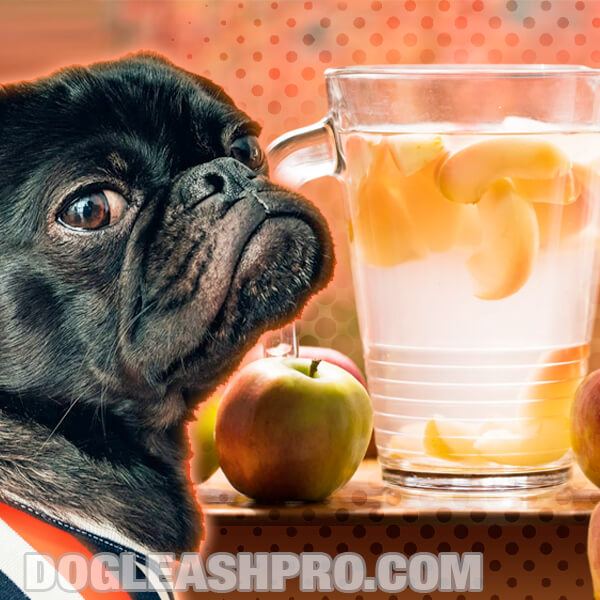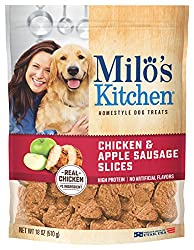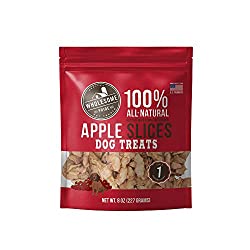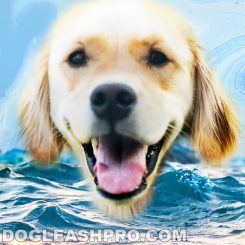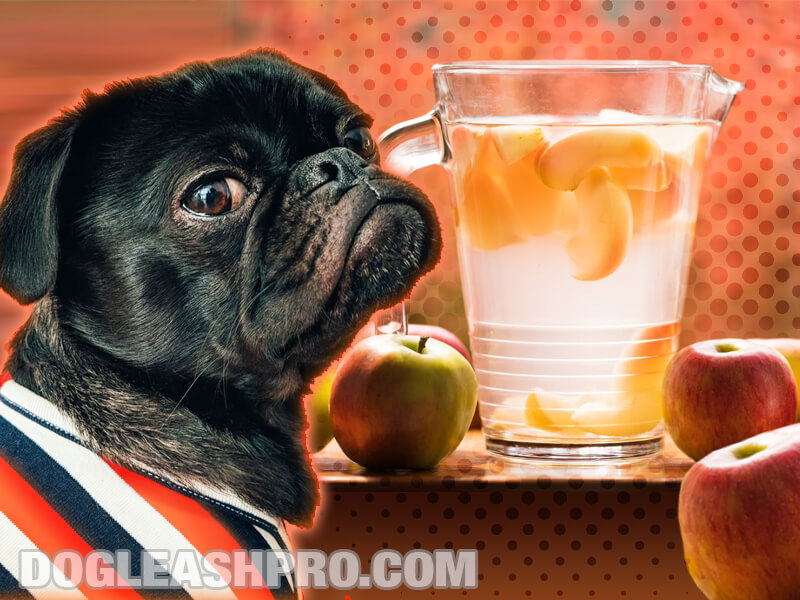
If your dog isn’t drinking enough water or isn’t drinking water at all, it’s natural that you try to come up with creative ways to keep him hydrated. You realize you have a bottle of Apple Juice in your cupboard which may seem like a healthy choice for your pooch. Before you offer some of that Apple Juice to your dog, you’ll want to read this article first. If you’re wondering, “Can my dog drink Apple Juice?” here’s the short answer.
Can dogs drink Apple Juice? No, dogs should not drink store-bought Apple Juice since it may contain tons of added sugar, artificial flavors and coloring, artificial preservatives, sweeteners, and chemical additives that may upset your dog’s stomach, cause diarrhea, and lead to a whole host of health issues. Also, the Apple Juice you find at the store usually contains fruit juice concentrates, which isn’t the best for dogs. If it’s homemade fresh Apple Juice, your dog can have it as an occasional treat.
In this article, we’ll discuss everything you need to know about Apple Juice and dogs. We’ll go over in detail why store-bought Apple Juice is bad for dogs and how it can negatively affect your canine friends’ health. We’ll also share how you can naturally add Apple Juice to your dogs’ diet if they love the sweet juice of Apples.
Table of Contents
Can dogs have Apple Juice?
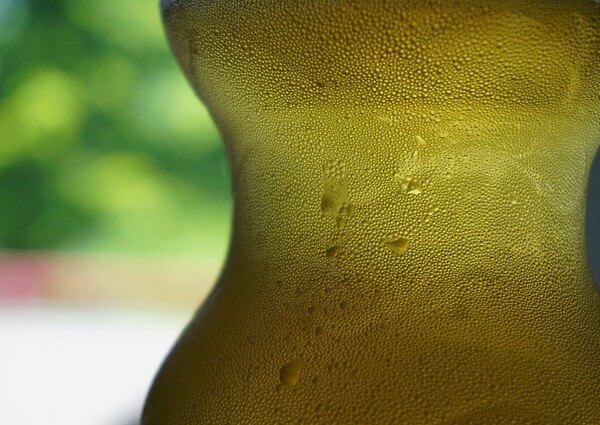
No, dogs should not have store-bought Apple Juice since most, if not all, contain fruit juice concentrate, chemical additives, added sugars or sweeteners, artificial preservatives that can cause upset stomach and diarrhea in dogs.
To fully understand why dogs should not have store-bought Apple Juice, let’s take a look at how most manufacturers make the Apple Juice. In this next section, you’ll also see why most store-bought Apple Juice contains artificial flavors and coloring. There’s a reason for this.
What’s in Apple Juice?
Most Apple Juice manufacturers make Apple Juice using the maceration and pressing process. Through this process, the Apples break down and the Juice is extracted. The Apple Juice is then treated to remove its natural pectin and starch.
Next, tons of water and other artificial flavors, coloring, and added sugar or sweeteners are blended into the Apple Juice. The artificial flavors and coloring are added to the Apple Juice to try to closely match the real and natural Apple Juice color and flavor the consumers are expecting. This way, no one will question whether it’s actually Apple Juice they’re about to drink.
Most of the Apple Juice you buy from the store usually contains over 80% water and very little of the content is actually real Apple Juice.
Instead of the natural and real Apple Juice you were expecting, the reality is that many of the popular Apple Juice brands you find at the store add artificial ingredients, cane sugar, high fructose corn syrup, sodium, fruit byproducts, and juice concentrate to the Apple Juice mix.
The juice from concentrate is made by pressing the Apple to a pulp and which results in a sticky, thick substance. The manufacturers will then evaporate the water content in order to remove the starch and this process dilutes the natural flavor of the Apple Juice.
This process of adding all the unnecessary and unnatural products into the Apple Juice is why many of the store-bought Apple Juices are unhealthy and harmful to dogs. If you take a look at any of the Apple Juice brands you find at the store, you’ll notice that it is high in sugar, carbohydrates, and calories when naturally, it shouldn’t be.
In fact, some manufacturers may try to get consumers hooked onto their Apple Juice by adding extra flavors and vitamins to make the Apple Juice more appealing and to offer the consumer a wonderful drinking experience.
Next, let’s take a look at one of the most popular Apple Juice brands you’ll find at your local grocery store and see why it is unhealthy for canine consumption.
You may be interested in: Can Dogs Drink Yakult?
Is Apple Juice bad for dogs?
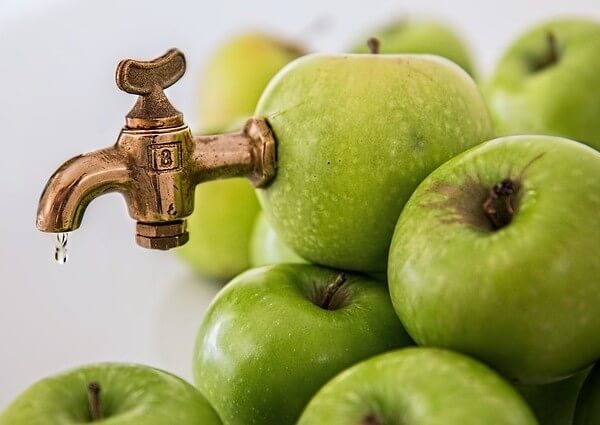
Yes, many store-bought Apple Juice brands are bad for dogs. To see why that is, let’s take a closer look at the ingredients in one of the most popular Apple Juice brands you’ll find in your nearest supermarket.
You can easily find Tropicana Apple Juice at your local grocery store or supermarket and if you think they are healthy for doggy consumption just because it is labeled as natural or 100% juice, think again.
So, is Apple Juice safe for dogs?
Due to its ingredients and nutritional profile, Apple Juice is not safe for dogs.
Here are the ingredients in Tropicana Apple Juice.
Tropicana Apple Juice ingredients
- 100% Apple Juice from concentrate* (filtered water and concentrated Apple Juice).
- Natural flavors.
- Vitamin C from malic acid and ascorbic acid.
*Contains concentrates from Germany, Austria, Italy, Hungary, Argentina, Chile, Turkey, Brazil, China, and the United States.
Nutritional Profile of Tropicana Apple Juice (10 fl oz or 295 ml)
| Name, Unit | Amount |
| Calories, cal | 140 |
| Sugar, g | 31 |
| Sodium, mg | 25 |
| Total Carbohydrate, g | 34 |
| Potassium, mg | 310 |
| Protein, g | 1 |
As we can see from the list of ingredients, the Juice in this well-known Apple Juice brand isn’t from freshly squeezed Apples.
Apple Juice concentrate isn’t healthy for dogs
Instead, the Juice is from concentrated Apple Juice, which means it went through a process where the natural flavor of the Apple Juice was diluted and then other natural flavors were added into the Apple Juice.
The ingredients don’t specify what these natural flavors are. We see that the Apple Juice concentrates are from different countries around the world and not just from the United States. You may be puzzled or concerned. Essentially, the Apple Juice in your hand right now is from Apple Juice concentrate and it is neither natural nor locally sourced.
Additionally, to enhance the drinking experience, vitamin C was added to the Apple Juice. Vitamin C comes from both malic acid and ascorbic acid.
Our canine friends’ liver naturally produces vitamin C or ascorbic acid and therefore doesn’t need their owners to offer them vitamin C.
Fun Fact: Nectarine is a fruit that naturally contains vitamin C, which is an essential antioxidant. But is it safe for doggy consumption? Check out Can Dogs Eat Nectarines? to find out!
Ascorbic acid and malic acid in Apple Juice can cause intestinal distress in dogs
It’s important to note that some dogs may experience intestinal distress when receiving excessive doses of ascorbic acid.
That’s because large doses of ascorbic acid can act as an intestinal irritant. If you know your pooch has a drug allergy or hypersensitivity, avoid feeding him any food or drinks with ascorbic acid in them.
Dogs that ingest excessive doses of ascorbic acid may experience the following:
- Diarrhea.
- Anemia.
- Calculi formation in the kidneys.
Acidity in general can cause diarrhea in dogs.
Now, when we take a look at the nutritional profile of Tropicana Apple Juice, we see that in just 10 fl ounces or 295 ml of Apple Juice, there are 140 calories, 34 grams of carbohydrate (31 grams of sugar).
High sugar content in Apple Juice is harmful to dogs
While the ingredients don’t contain sugar or any form of sugar, there are 31 grams of sugar in the nutritional profile. You’re probably wondering how it has high sugar content in such a small bottle of Apple Juice. That’s because the sugar is probably coming from the natural flavors.
When dogs consume a lot of sugar, such as from Apple Juice, their blood sugar level can suddenly spike. Additionally, sugary drinks and food can cause a whole host of health issues in dogs such as:
- Diabetes.
- Weight gain.
- Canine obesity.
- Metabolic changes.
- Upset stomach.
- Dental diseases such as cavities and tooth decay.
- Pancreatitis (in severe cases).
High sodium content in Apple Juice is dangerous to dogs
Let’s not forget that there is 25 mg of sodium in a 10 fl ounce bottle of Tropicana Apple Juice. While it isn’t a lot of sodium for us, it is indeed a lot of sodium for our dogs.
Too much sodium consumption can cause salt poisoning in dogs. Signs and symptoms of sodium poisoning include:
- Swollen lips and tongue.
- Loss of appetite.
- Nausea.
- Vomiting.
- Upset stomach.
- Diarrhea.
- Very thirsty.
- Frequent urination.
- Difficulty breathing.
- Convulsion.
- Confusion.
- Fever.
- Headache.
- Increased heart rate or tachycardia.
- Muscle weakness and spasms.
- Loss of coordination.
- Lethargy.
- Seizure.
This is why it’s crucial that dog owners take a look at both the ingredients and the nutritional profile of any drink or food before feeding it to their furry family members.
In this case, you’ll notice the high sugar and salt content in your supposedly natural Apple Juice.
Artificial sweeteners such as xylitol in some Apple Juice can be toxic to dogs
There are some Apple Juice brands that use artificial sweeteners such as xylitol to make the Apple Juice taste sweet without using actual sugar.
However, xylitol is extremely toxic to dogs. Signs and symptoms of xylitol poisoning include:
- Lethargy.
- Vomiting.
- Jaundice.
- Loss of coordination.
- Difficulty standing and walking.
- Collapse.
- Muscle tremors.
- Muscle weakness.
The more ingredients that are added to the Apple Juice during the manufacturing process, the less healthy the Apple Juice is for our dogs.
Is Apple Juice ok for dogs?
As we can see, Apple Juice is not ok for dogs to consume. If your pooch had a few licks of the Apple Juice, they should be fine if the Apple Juice doesn’t contain toxic ingredients like xylitol in it. Also, find out how much of the Apple Juice your dog drank.
Make sure you check the ingredients in the Apple Juice and if it does contain toxic ingredients in it, contact your vet immediately. Xylitol poisoning requires immediate medical attention and treatment.
In general, it’s best to keep store-bought Apple Juice away from your canine family members.
Is Apple Juice good for dogs?
Store-bought Apple Juice and many Apple Juice brands are not good for dogs. As we discussed above, many Apple Juices you find at your supermarket and grocery stores contain high amounts of sugar, carbs, calories, and even salt.
Some Apple Juices may even contain artificial sweeteners, artificial flavors and coloring, chemical additives, and artificial preservatives. None of these are healthy or safe for doggy consumption.
Healthy and safe alternatives to Apple Juice for dogs
Instead of offering your dog Apple Juice, here are some healthy and dog-friendly options to try.
Small slices of Apples
Try giving your four-legged friends slices of actual Apples instead. Apples themselves are healthy and nutritious to dogs. They contain dietary fiber. Be sure to slice the Apples into small pieces so it’s easier for your dogs to chew and digest.
When dogs eat Apple slices, the texture of the Apple helps to freshen your dog’s breath and clean their teeth. On the plus side, you’ll know that the Juice they’re ingesting is from the actual Apple itself.
If your precious pooch wants a crunchy snack, we highly recommend giving them freshly sliced Apple and not the Apple Juice. Apple Juice (homemade or store-bought) does contain some levels of acidity and that may upset your dog’s stomach and fresh fruit juice will still contain too much sugar.
Be sure to remove the pit and the Apple seeds.
Handy Hint: Dogs can also try Turnips in moderation as they are low-calorie, delicious, and full of nutrients.
Water is the best way to hydrate your dog
The old saying, “simplicity is key” stands true here. Instead of Apple Juice, offer your pooch plain fresh cool water. Water keeps your canine friends hydrated and healthy.
If your dog isn’t in the mood for water or needs an extra boost of hydration, you’ll want to check out What Can Dogs Drink Besides Water? to find out what else your dogs can drink besides water.
Whenever my two dogs want something crunchy to snack on, I offer them these. They wag their tails every time I get these snacks for them and they spin in circles with excitement.
So, can dogs drink Apple Juice?
From this article, we can see that our four-legged friends should not drink Apple Juice. To keep our canine friends safe and healthy, it’s crucial that we offer them nutritious food that is low calorie and low in sugar.
When it comes to drinks, the best drink for our dogs is water. Water helps to keep our dogs hydrated and healthy, which Apple Juice does not provide. Instead, Apple Juice is high in sugar, calories, carbs, and even salt – all of which are not good for our dogs.
For these reasons, it’s best to keep Apple Juice away from our canine friends.
DISCLAIMER: THIS WEBSITE DOES NOT PROVIDE MEDICAL ADVICE
The information, including but not limited to, text, graphics, images and other material contained on this website are for informational purposes only. No material on this site is intended to be a substitute for professional veterinary advice, diagnosis, or treatment. Always seek the advice of your veterinarian or other qualified health care provider with any questions you may have regarding dietary needs.
Resources:
https://en.wikipedia.org/wiki/Apple_juice
https://www.avma.org/javma-news/2019-03-01/study-finds-overweight-dogs-live-shorter-lives

With over five years of specialized experience as an animal writer, my expertise lies in dog nutrition, health, behavior, grooming, and training. I am dedicated to delivering helpful and informative content that caters to the well-being of our furry friends. My primary goal is to empower pet owners with knowledge and ensure our canine companions thrive in health and happiness. In my free time, I love volunteering at local dog rescue centers.
